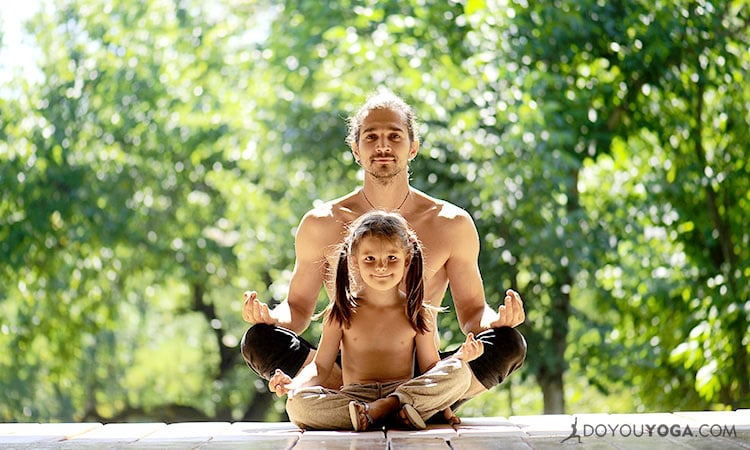I think it’s an appropriate time for this admission (now that my column “A More Beautiful Life” is a few months old)…
I don’t practice yoga (asana) that much. Gaaaasssp! I know—blasphemy. How could I possibly write for a yoga blog without upholding a daily, multi-hour practice? The answer is simple: I have a 2-year-old.
Anyone who also has one (or did), instantly knows EXACTLY what I’m talking about. For those in “my boat,” enough said. For those who are not, please understand this isn’t another lame excuse for not stepping on a mat.
Being a parent is simply it’s own form of yoga, and stepping on a mat now becomes secondary. There I said it—you can be a yogi simply by being a parent. And here’s why: the opportunities for self-realization that occur during our yoga practice occur in other facets of life, and parenting is perhaps the most enduring/grueling/profound facet, as it NEVER ENDS. Once you’re a parent, you’re always a parent.
Here are 4 reasons why Being a Dad (or a Mom) is its own practice of yoga:
1. Returning to the Breath
In asana practice, returning to the breath is our reminder to be present. The breath not only serves this reminder but is also a vehicle for dealing with the discomfort within the practice. This holds equal relevance in the realm of parenting; sometimes being a parent is sweet and easy. And other times it simply-is-not.
When the going gets tough, it’s easy to get caught up in different thought patterns, to become more reactive, and to dismiss the “bigger picture.” If my kid is throwing a temper tantrum (full body convulsions accompanied by blood-curdling screams) it’s easy to react—to try and end the tantrum, usually by getting aggressive and trying to “out compete” the energy of the child.
Returning to the breath in these moments (and the countless others) helps us see our role, not only as guides, but also as “holders of space.” In order to listen deeply, we must be present, calm, and non-reactive. Allowing the breath to be our guide we become what our child needs—a tuned-in, supportive, and humble role model.
2. Honoring the Whole
When I’m on the mat, I find it seductive to focus on particular areas of the practice, while completely ignoring others. And as is the case with these things, usually what I ignore is the thing I should be giving the most attention. It could be that I rely on already cultivated strength areas to “get me through" poses that actually require utilizing parts of myself that are less developed.
In parenting, our attention (and praise) has an equal effect of over-developing certain aspects of our child while sub-consciously denying other aspects. Noticing my child’s proficiency in athletics or telling her how good she is in this or that is fine, yet we need to also give attention to “the thing” that we deny. This can be achieved through our choice of language in offering the praise, yet mostly comes from our simple recognition that what “we see” is only part of the picture.
Honoring the whole is a reminder that it isn’t our job as parents to mold and shape our child. The job of a parent is to share wisdom and give children a safe space to explore their own gifts.
Note: I’d like to be clear that what I mean by “safe space” is not the elimination of risk or danger, but rather the creation of an emotional and physical playground for self-exploration—one in which “risk” is a part.
3. Having Many Gurus
Some people gravitate towards one teacher—the guru. I think this approach to learning is probably a fine way of going about things, yet for me, I find greater value in learning from many teachers.
As a parent, our fundamental experience of parenting comes from those who parented us. Our parents do/did the best they can — and yet what they’ve taught us only scratches the surface of what is possible.
It’s first and foremost of utmost importance to trust our own intuitions when parenting, but there is also a need to cultivate mentors—to learn from the experiences of others. Life is a constantly growing, evolving journey and everyone contributes to our sense of “the possible”—being open to this reality can shape our parenting in profound ways.
4. Experiencing The “High”
I’m not going to say this is the reason many of us take a yoga class, but it happens to be a lovely fringe benefit—the high of yoga. Life is typically good when we wipe the sweat off our face and begin to roll up the mat after an invigorating class.
Parenting can generate a “high” unlike any other. The love, the unrestrained play, the general “awe” of seeing your kid out there in the world, moving around and experiencing life—IS the joy of parenting. There aren’t words to do it service, it’s a full body experience of beauty—of appreciation and gratitude.
And the best part? There is no rhyme or reason as to when you’ll experience “the high”. It just happens. Again and again and again. There is no comparison. There is no relationship like this. It is f*cking beautiful.
There you have it—the Yoga of Being a Dad. I could go on, but I think it’s time to unroll the mat…after all, us parents DO still have our moments.


